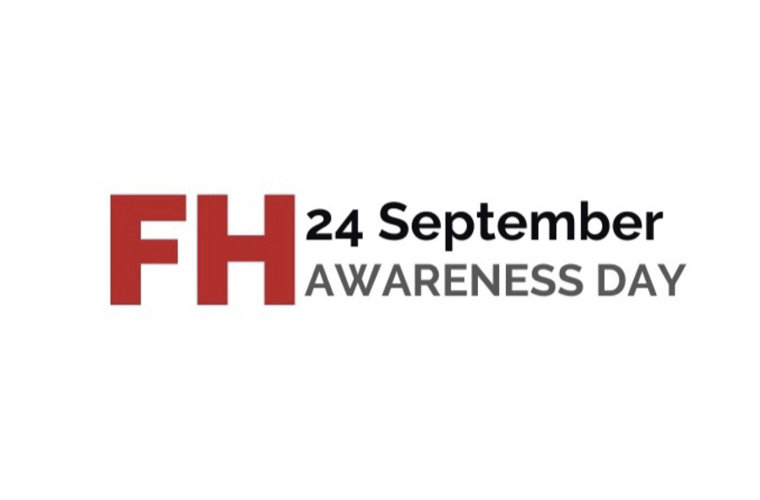
FH Awareness Day 2023 is about engaging and empowering the wider community in the mission for cardiovascular health (CVH).
Cardiovascular disease (CVD) is a general term for conditions affecting the heart or blood vessels. They include coronary heart disease, cerebrovascular disease, peripheral arterial disease, rheumatic heart disease, congenital heart and deep vein thrombosis and pulmonary embolism[1].
CVDs are the leading cause of death globally, with over three quarters of them taking place in low- and middle-income countries. In 2019, they caused 18.6 million deaths worldwide . It represented over 32% of all global deaths, where 85% of them were due to heart attack and stroke.
The burden of disease continues. In 2019, nearly 400 million years of healthy life (quantified as disability-adjusted life years or DALYs) were lost due to cardiovascular disease (CVD). This marks a 24% increase in the global CVD burden compared to 2000 (316.9 million DALYs)[2].
And yet, up to 80% of CVDs can be prevented[3] , provided the underlining causes can be identified and effectively addressed. In some cases, this means addressing behavioural risk factors such as tobacco use, unhealthy diet and obesity, physical inactivity and harmful use of alcohol. In other cases – like the CVD caused by familial hyperlipidemias, the key lies in early screening, detection and appropriate management (incl. lifestyle modifications and therapies). However, to achieve meaningful results the engagement and collaboration between the wider community of multidisciplinary stakeholders is critical.
FH stands for Familial Hypercholesterolaemia and means genetically caused very high LDL cholesterol. It is the world’s most common, monogenic condition. This serious CVD risk factor affects over 30 million people worldwide, and 2.5 million people in Europe, of which 500’000 are children. Undetected and unmanaged FH can lead to atherosclerosis and early cardiovascular disease including premature heart attacks and even death. Despite being named by the WHO a Global Public Health Burden over a quarter of a century ago, it is still very poorly diagnosed and ineffectively managed. Based on the available data from the global FH registry, it is estimated that only 10% of the affected people have been identified to date. In other words, 9 out of 10 people with FH do not know they have it and are not appropriately managing their very serious CVD risk factor.
Once FH is appropriately diagnosed and managed, those living with the condition can live a long and "normal" life. Those diagnosed early in childhood adopt easily the new lifestyle, where taking daily medication and adhering to simple rules – no smoking, physical activity and a healthy low-fat diet - are just a part of daily life.
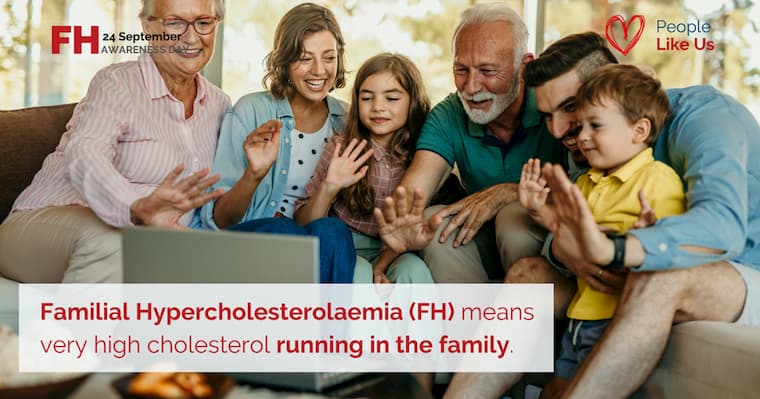
Every year, on September 24th, FH Awareness Day is observed. It takes place 5 days before World Heart Day.
This year, the FH Europe Foundation together with the Network of patient organisations, patient ambassadors, medical experts, supporters, and friends is engaging the international community to raise awareness, educate and to advocate for a change which has the potential for a tremendous shift – from cardiovascular disease to cardiovascular health.
FH Europe Foundation is embarking on a three-pronged approach to drive awareness for FH Awareness Day. Providing three very different yet complementary elements allows us to reach a wider audience.
The theme running throughout the whole FH Awareness campaign is meant to put the people with FH at the heart of all activities. “People Like Us” is about stories told by patients, and images of real patients. Over the course of one month they will be educating, advocating, sharing. Starting with the social media campaign People Like Us, explains that FH is an invisible disease, and it doesn’t matter who you are, what you look like, your age, gender, or ethnicity. You can be affected if you inherited it. A toolkit with basic social media assets, building on simple messages, scientifically validated, and using images of everyday situations and people including the patients from the FHEF network aims at addressing wider, international public. The campaign has been translated into 13 languages and is being shared from August 24th on social media in collaboration with the Network members across Europe, and organisations in South America, Middle East and Australia.

This year, for the first time, FH Europe Foundation is collaborating very closely with the European Atherosclerosis Society (EAS) on an unconventional educational programme aimed at the international members of EAS community. For the duration of a week, a series of 5 webinars of 30min, will be hosted live with patient ambassadors and advocates partnering with researchers and clinicians as speakers and moderators. From topics of Genetics, Combined testing for other CVD risk factors (elevated Lp(a)), Access to novel treatments, to more unusual ones like focusing more on social sciences and policy like Screening and the EU CVH policy, Challenges faced by children with FH – the medical community will be exposed to new learnings …through the lens of the patients and citizens.
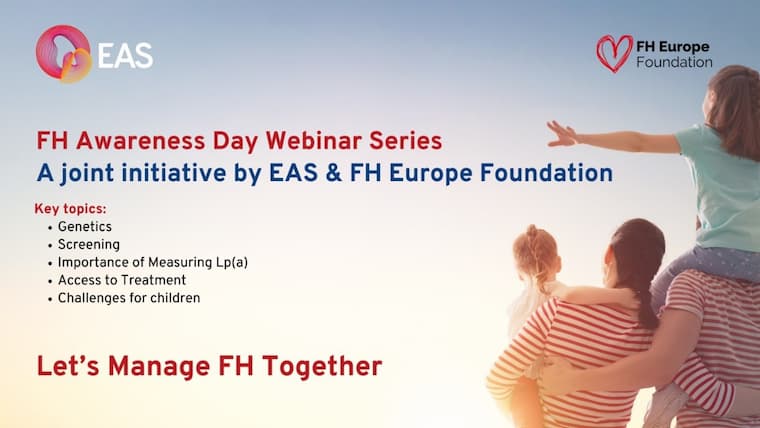
On 21st September, FH Europe Foundation will be hosting a webinar with 7 international female panelists (why not?). The discussion, rather than a series of slide presentations, will be moderated by a Patient Ambassador, living with FH and elevated Lp(a). Among the 6 female speakers is the leading researcher and advocate for greater research about women and CVD/FH/pregnancy. She is a young generation champion researcher and clinician from Germany, combining her experience to inform better health policies. We have 4 female patients and fierce advocates who between them have a number of misdiagnosed heart attacks, experienced gaslighting in the interactions with clinicians and the community. Make sure you join them by registering now. The topic of the webinar "FH and the gender bias - misdiagnosed and under treated".
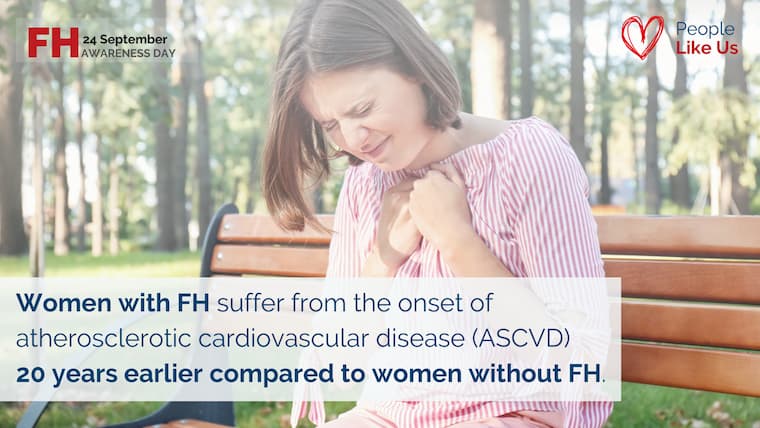
Many biases exist in the healthcare system including the mistaken belief that women are more protected from heart disease due to oestrogen levels. In addition, FH is commonly misunderstood, and standard risk calculators do not take into consideration the increased risk of FH due to lifelong high cholesterol. The onset of atherosclerotic cardiovascular disease (ASCVD) occurs 20 years earlier in women with FH than in those without FH.[4][5]
The combination of the social media campaign and the webinar is meant to help relaunch a dedicated ‘Women and FH Survey’, as the existing research and data gap on how FH affects women, their family planning decisions as well as health pre-, during and post pregnancy is enormous. The survey is available in 16 languages, and the goal is to collect 1000 responses.
This September, it will be one year since the publication of the of Prague Declaration on Achieving FH Paediatric screening across Europe[6]. The high-level policy document, launched under the Czech EU Presidency as a result of a Senate meeting in Prague in 2022, was endorsed by the Czech Ministry of Health. It built on recognition of the European Commission of FH Paediatric Screening as a Public Health Best Practice and the high-level technical meeting from 2021, under the Slovenian EU Presidency, which led to 2 scientific publications.
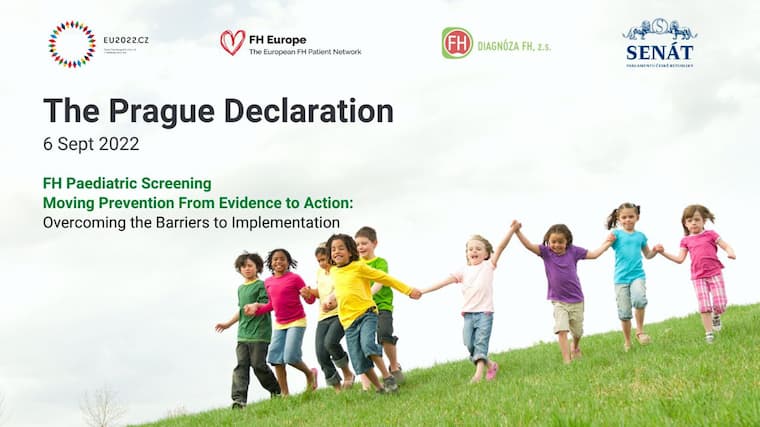
The Prague Declaration has been presented across Europe, in various scientific and policy and advocacy meetings. It even made its way to the National Lipids Association meeting in the USA. To date is has been endorsed by over 100 individuals including EU politicians, scientists, medical experts, patient organisation leaders and individual patients plus over 60 organisations from the World Heart Federation, the European Alliance to Cardiovascular Health, the European Public Health Alliance and European Connected Health Alliance to international medical societies, national patient organisations and medical universities[7]. It serves as a blueprint for FH screening programs and national CVH Plans in Czechia, Austria, Bulgaria, Cyprus, Poland, Germany, France, Spain.
The impact of the Prague Declaration and related advocacy and policy influencing in the space of FH early detection and CVD prevention has been recognised and appreciated internationally, offering bigger opportunities and possibilities, leading to a paradigm shift from Cardiovascular Disease towards a global concept of Cardiovascular Health (CVH).
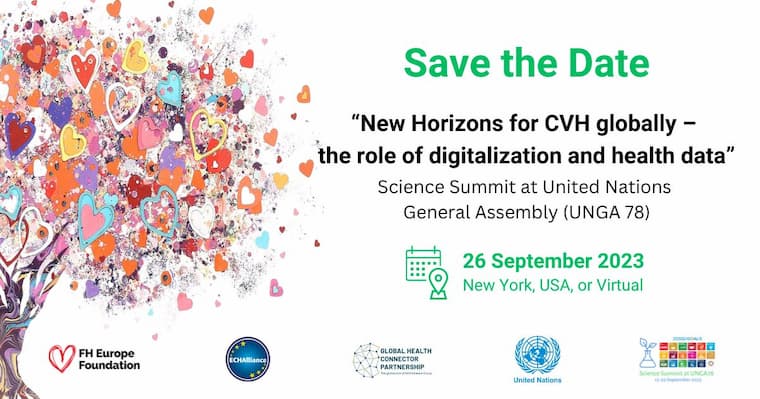
And so, the FH Awareness Day efforts will conclude at the United Nations General Assembly (UNGA) Science Summit[8] in New York, on September 26th, where the FH Europe Foundation team will be addressing an international multidisciplinary community, talking about innovation, health data and digitalisation in the context of improved FH screening, CVD prevention implementation in very specific terms, referred to in the document, and unquestionably contributing to the CVH promotion on the international and national level. (You can register here to join online or in person).